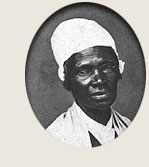  here
had been opponents to the enslavement of blacks in America ever
since colonial days. Slavery had been mostly abolished in the
North before 1800. Slave uprisings in the South, most notably
Nat Turner's rebellion in Virginia in 1831, dramatically underscored
the risks slaves would incur themselves to break their chains
of bondage. But it was not until the 1820s and 1830s, when the
rising prosperity of the South’s cotton plantations began
making slavery more lucrative, that Americans in significant
numbers started to raise objections to this “peculiar institution.”
In its early stages, the movement to abolish slavery focused
largely on schemes for gradual colonization of ex-slaves in
Africa. As time passed, however, the abolitionists became more
critical of slavery’s inhumanity and more pressing in their
demands for quick emancipation. here
had been opponents to the enslavement of blacks in America ever
since colonial days. Slavery had been mostly abolished in the
North before 1800. Slave uprisings in the South, most notably
Nat Turner's rebellion in Virginia in 1831, dramatically underscored
the risks slaves would incur themselves to break their chains
of bondage. But it was not until the 1820s and 1830s, when the
rising prosperity of the South’s cotton plantations began
making slavery more lucrative, that Americans in significant
numbers started to raise objections to this “peculiar institution.”
In its early stages, the movement to abolish slavery focused
largely on schemes for gradual colonization of ex-slaves in
Africa. As time passed, however, the abolitionists became more
critical of slavery’s inhumanity and more pressing in their
demands for quick emancipation.
This mounting combativeness strengthened the cause in the North, but below
the Mason-Dixon line, where anti-slave sentiment had once been fairly strong,
it inspired defensiveness. By the 1850s the spokesmen for this region were countering
the pleas of abolitionists with discourses proclaiming the unalloyed virtues of
slaveholding and the sins of free labor. Although it would be problematic to single
out the debate over slavery and its expansion into the western territories as
the sole causes of the Civil War, there is no doubt that these bitterly divisive
issues kindled the secession movement that made that conflict inevitable.
|

